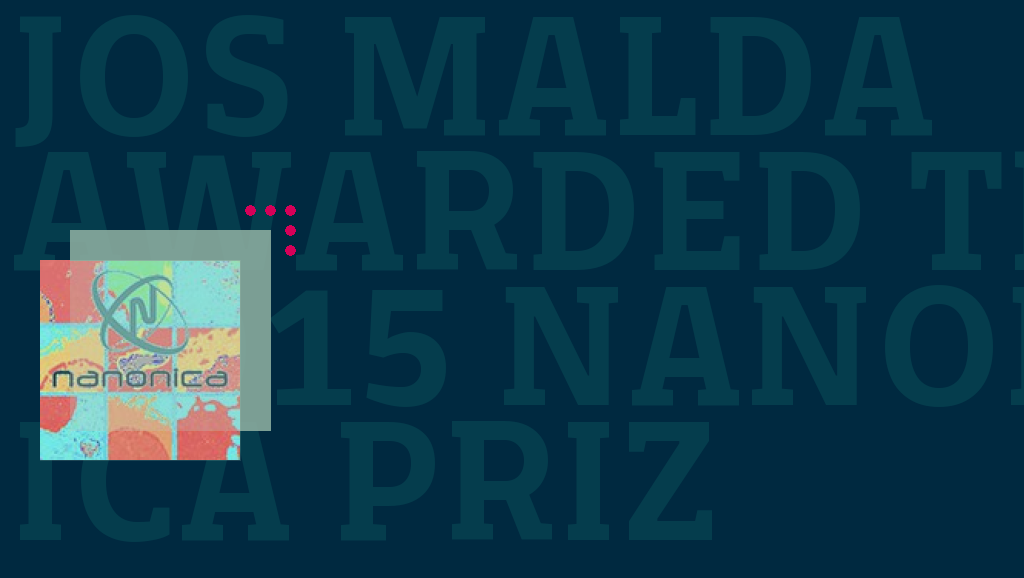Press Release:
Reinforced hydrogels for cartilage tissue repair.
The 2015 Nanonica Prize has been awarded to Jos Malda, associate professor at the University Medical Center Utrecht in the Netherlands, for developing a new microfiber 3D printing technique that can increase the stiffness of a hydrogel composite by up to 54-fold, within a similar range as that of the human cartilage. Dr. Malda is Head of Research at the Department of Orthopedics, University Medical Center Utrecht, in The Netherlands.
The international team led by Malda published a paper in Nature Communications (“Reinforcement of hydrogels using three-dimensionally printed microfibres”, 28 April 2015), to unveil their biofabrication innovation that can be used for reinforcing constructs for repairing articular cartilage.
Adopting a technique called melt electrospinning direct writing (where layers of thin fibers are deposited, while their orientation can be controlled), the researchers have been able to reinforce gelatin methacrylamide hydrogels with special fibrous polymer scaffolds, which display a very high porosity. Cell therapy is already being applied to repair cartilage damage, but the typical hydrogels being used are usually either too weak or do not constitute the most convenient environment for cellular growth. Being both more stable and having a high stiffness, these new reinforced hydrogels address the mechnical challenging environment of the articulating joint and may be able to help fix larger joint defects.
The technique is definitely promising. “We have recently established the Utrecht Biofabrication Facility, a leading knowledge center in biofabrication. Here, we are bringing together engineers, materials scientists, cell biologists, clinicians and commercial partners to create a fostering environment for the development, evaluation and clinical translation of 3D tissue constructs”, Dr. Malda says.
Nanonica has been scanning and analyzing the development of nanotechnology since its very formation. This observatory experience laid the foundations for the Nanonica Prize, an award that recognizes the most significant breakthrough of the year. The previous edition was awarded ex-aequo to Hui Ying Yang (University of Technology and Design, Singapore) for an ultra-long carbon nanotube-based membrane that is able to remove salts and other contaminants from water, and to Michael McAlpine (Princeton University) for combining electronics and living cells to create the first 3D bionic human ear with superhuman hearing capabilities.
This year the Nanonica Prize has been enriched through the inclusion of the Responsible Research and Innovation Special Mention, thanks to the collaboration of the Giannino Bassetti Foundation, active in the field of Responsible Innovation for more than 20 years.
Piero Bassetti, President of the Giannino Bassetti Foundation and also President of this year’s Jury, comments that “the Giannino Bassetti Foundation is pleased to have been able to add the Special Mention of RRI to this year’s prize. This study was published in an open access journal, and certainly moves towards adding an important chapter to the knowledge and context of biofabrication, capable of modifying future treatment approaches in terms of personalization and cost reduction thanks to 3D printing techniques. Our Special Mention also aims to incentivise the promotion of the discussion of a responsible approach to bioprinting in all sectors, including those more industrial”.
Nanotechnology is a new approach that refers to understanding and mastering the properties of matter at the nano-scale: one nano-meter (one billionth of meter) is the length of a small molecule. At this level, matter exhibits different and often amazing properties and the borders between established scientific and technical disciplines fade. Hence the strong interdisciplinary character that is associated with nanotechnology.
Nanonica S.A. is a Swiss based-company created in 2006, together its Spanish-based subsidiary, Nanonica Europe S.L., is devoted to the transfer of knowledge from academia to industry in the areas of nanotechnology and microtechnology with clearly defined objectives: Identify the best talents, expertise and projects to address the needs of the industry; Enable companies to identify existing know-how and attractive projects in universities and research centers that meet their needs and expectations; Develop and commercialise the results of academic breakthrough research.
Fondazione Giannino Bassetti (FGB) is an Italian non profit foundation. FGB was founded in 1994 and has promoted responsibility in innovation within the technosciences, entrepreneurship and governance for more than 20 years. Consolidating communities of practice, Fondazione Giannino Bassetti promotes cooperation between the protagonists of innovation and participates in defining and producing the responsible innovators of the future (researchers, administrators and entrepreneurs) through high-level courses, study grants, research PhD, fellowships and prizes, and through European projects, events which involve citizens, research centers, industry and media and promoting the public debate in all forms in order to provoke thinking and discussion about responsibility in innovation.
——————
















